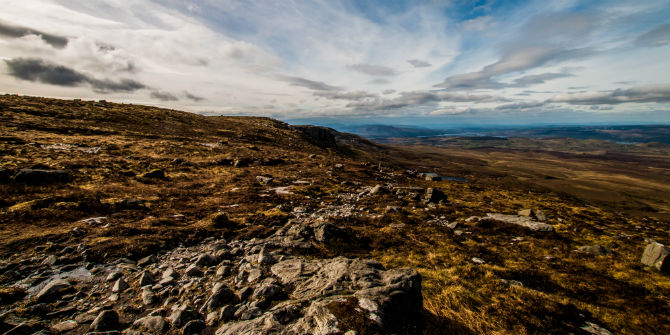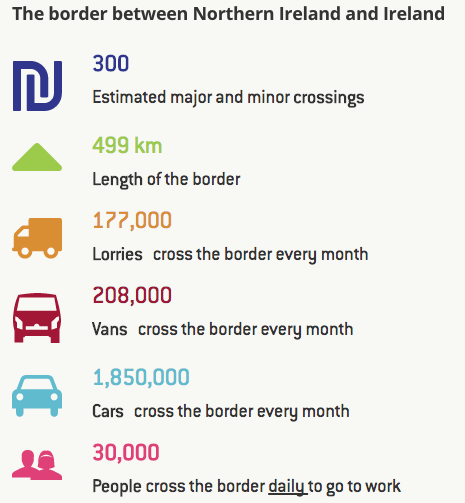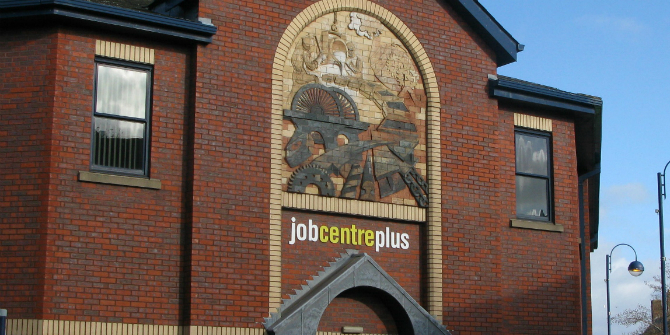 For all practical purposes, writes Filippo Biondi, the border between Eire and Northern Ireland has disappeared. Thirty thousand people cross the 500km line each day just in order to go to work. So what will happen when it becomes the land border between the EU and the UK? He analyses the Democratic Unionist Party’s priorities and looks at possible solutions to the problem of customs checks.
For all practical purposes, writes Filippo Biondi, the border between Eire and Northern Ireland has disappeared. Thirty thousand people cross the 500km line each day just in order to go to work. So what will happen when it becomes the land border between the EU and the UK? He analyses the Democratic Unionist Party’s priorities and looks at possible solutions to the problem of customs checks.
As Brexit negotiations get underway, we still do not know the outcome of the talks between the Conservative Party and Northern Ireland’s Democratic Unionist party (DUP), which are being held with the aim to prop up Theresa May’s government after the Conservatives lost their majority at Westminster.
In a previous Bruegel blog about Brexit we concluded that “Northern Ireland represents a small region in the UK (less than 3 per cent in population terms), [so] it may struggle to exert pressure and wield influence in the upcoming negotiations“. But with the Conservatives dependent on the DUP, it now seems likely that Northern Irish issues will attract more attention during the upcoming Brexit negotiations. Indeed, Northern Ireland always deserved this attention, given the significant political, social and economic implications of Brexit for the region.

It is thus worth understanding how this shift may affect the Brexit outcome. The key issue at stake is the Irish land border, so we present the complex (and still unsolved) trade-offs around the future of this border.
The DUP position on Brexit: get the best possible Brexit deal for Northern Ireland
In their political manifesto, the Democratic Unionists listed many objectives for the future relationship with the EU:
- Ease of trade with the Republic of Ireland and throughout the European Union;
- Maintenance of the Common Travel Area;
- Strengthened relationships across the four component parts of the United Kingdom with no internal borders;
- Full consideration of the particular circumstances of Northern Ireland, with a land border with the EU;
- Progress on new free trade deals with the rest of the world;
- A frictionless border with the Republic of Ireland assisting those working or travelling in the other jurisdiction;
- A comprehensive free trade and customs agreement with the European Union;
- Customs arrangements which facilitate trade with new and existing markets;
- Arrangements to facilitate ease of movement of people, goods and services;
- Jurisdiction of European Court of Justice ended and greater control over laws.
They conclude that “the stronger and more positive the agreements reached, especially on trade and customs relationships, then the better for the particular circumstances of Northern Ireland”.
However, this wish list is not internally consistent, in particular regarding the impact on cross-border movement of goods and people.
As noted by Prof Winters, from the UK Trade Policy observatory of the University of Sussex, the current debate is full of weasel words which mean whatever the speaker wants them to mean at the time. “Customs agreement” is one of those. It typically entails procedures to minimise the waiting times and paperwork associated with crossing the border. “Frictionless border” is another deceptive concept. As noted by academics at Durham, Birmingham and Newcastle Universities, “while it is highly unlikely that a wall will be built on the border, some (and perhaps especially those living close to the border) might consider other types of border checks to be hard. There might be, for example: spot checks on people travelling across the border; restrictions upon the goods that can be taken across the border; duties to declare goods going across the border; the need for work permits; electronic monitoring of border crossings; the presence of some physical checkpoints”.
The shared land border: a thorny dossier in the divorce proceedings
It is estimated that that there are up to 300 major and minor crossings along the contorted 499km border, which meanders through towns, villages, local communities, farms and occasionally houses.
A recent Irish government survey noted that there are now around 200 border crossing points and an estimated 177 000 lorries, 208 000 vans and 1.85 million cars crossing the border every month. Around 30 000 people cross the border each day.
Since the Good Friday Agreement in 1998, which ended more than 30 years of violence, the border has disappeared for all practical purposes. As recognised by the Irish government, “the disappearance of physical border crossings and checkpoints is both a symbol of and a dividend from the success of the peace process”. Now Brexit threatens to bring the physical border back, with its echoes of division and conflict.
No major impediments to the maintenance of the Common Travel Area
No matter the result of the Brexit negotiations, Irish people should continue to have the right to travel, live and work freely in the UK. UK citizens should retain the same rights in Ireland. This is the result of the Common Travel Area (CTA), a bilateral arrangement which long predates Irish and UK membership of the EU.
There is consensus between the UK and Irish Governments that the Common Travel Area arrangements should be retained, and this has been recognised also within the EU Commission’s negotiating directives. Analysis by the Irish authorities has not identified any obvious legal barrier to the CTA being maintained bilaterally in a manner consistent with Ireland’s EU obligations. In particular, Ireland’s non-participation in Schengen would facilitate the continuation of the CTA, because it means that all entrants to the CTA are checked by UK or Irish authorities, even those arriving from EU countries.
These CTA-based freedoms to travel, live and work will apply to British and Irish citizens only. The implications of Brexit for the free movement of EU citizens across the border are another question. But, so long as the UK and EU reach an agreement which at least continues to allow visa-free travel, as is very likely, then EU citizens will be free to visit the UK for a short period for holidays or to conduct business. Thus, looking purely at the movement of people, there should be no need to close the Irish land border to travellers and instigate universal document checks.
As pointed out by Raoul Ruparel, co-director of Open Europe, “border checks from a purely security perspective are already in place since the UK and Ireland are not in Schengen and it seems likely the UK could continue to trust Ireland to enforce the border of the Common Travel Area.” Once people have entered the UK, “the enforcement of ensuring people do not over-stay cannot be at the border but via other mechanisms such as regulating access to social security and the job market.”
All the parties want minimum disruption, but is wanting it enough?
So far, the Irish and UK governments as well as EU representatives have stated that they do not wish a return to a “hard border” between Northern Ireland and the Republic of Ireland. This is because of the considerable negative economic, social, political, security and psychological impacts on people of the border communities.
However, the Secretary of State for Exiting the European Union, David Davis, bluntly described the complex reality of things:
“How on earth do you resolve the issue of the border with Northern Ireland and the Republic of Ireland, unless you know what our general borders policy is, what the customs agreement is, what the free trade agreement is, whether you need to charge tariffs at the border or not? […] You can’t decide one without the other.”
As a matter of fact, if we presume the stable continuation of the CTA, the future of the border in terms of the movement of both goods and people intrinsically depends on the scope of any post-Brexit trade arrangement.
Custom checks will be unavoidable in case of withdrawal from the Customs Union
While negotiations are underway, there will be no immediate establishment of customs posts along the border. However, after the official withdrawal of UK will effectively make the Republic of Ireland-Northern Ireland border an external EU border.
If the UK also withdraws from the Customs Union, it will be inevitable to re-establish some sort of customs control. This is because goods from outside the Customs Union must pass through full customs clearance processes. This is not least to address risks around the origin of goods and the application of the common external tariffs.
As noted by de Mars, Murray, O’Donoghue and Warwick, there are light-touch models of customs enforcement (with limited spot checks and electronic filing of customs documentation) practiced on EU borders with EEA countries. One example is the border between Sweden and Norway, which is not a member of the customs union but is part of the EEA. However, even in such a scenario Ireland will still have to comply with the requirements of the Union Customs Code. And a more onerous arrangement is likely if the border is not an EU-EEA border, but a fully external border. For example, some sanitary and phytosanitary checks would be introduced for agri-food products, especially if regulatory divergence emerges. This has been recognised by the European Union Committee of the House of Lords in its report on the UK-Irish relations: “the experience at other EU borders shows that, where a customs border exists, while the burden and visibility of customs checks can be minimised, they cannot be eliminated entirely. Nor, while electronic solutions and cross-border cooperation are helpful as far as they go, is the technology currently available to maintain an accurate record of cross-border movement of goods without physical checks at the border”.
Philip Hammond, the Chancellor of the Exchequer, reaffirmed yesterday that UK will leave Europe’s single market and customs union. It therefore seems unavoidable that there will be some form of customs checks on the Northern Ireland-Republic of Ireland border.
Looking ahead to future arrangements, we must therefore presume that the final destination of Brexit will be a new UK-EU Free Trade Agreement (FTA) that would allow UK to exercise an independent trade policy and conclude its own trade agreements with states outside the EU. KPMG has reviewed the two main existing models: the Comprehensive Economic and Trade Agreement (CETA) with Canada; and EEA membership with exclusion from the Custom Union like Norway. In both these cases goods cross a customs border, which means customs clearance would be unavoidable, inevitably resulting in some form of physical manifestation of the Irish border.
A peculiarity of the Norwegian option is that this process is streamlined, with much of the bureaucracy completed in advance. This makes the Norway model more attractive for UK. However, Norway is an EEA member and, according to the KPMG analysts, “there is no guarantee that the EU would offer the same streamlined procedures to a country outside the Single Market. EU customs law is currently directly applicable to the UK. Without it being so, the EU is simply less likely to accept that goods coming from the UK are of British origin, without evidence in advance”.
Could a special status for Northern Ireland offer a “flexible and imaginative solution”?
In the EU Commission negotiating directives, formally endorsed by the European Council on 22 May 2017, it is recognised that “the unique circumstances and challenges on the island of Ireland will require flexible and imaginative solutions. Negotiations should in particular aim to avoid the creation of a hard border on the island of Ireland, while respecting the integrity of the Union legal order”.
One way to avoid a “hard” land border for goods would entail moving custom checks so that they fall between the islands of Ireland and Great Britain – between Northern Ireland and the rest of the UK. Many analysts believe that this approach would be less disruptive and easier to implement than applying controls at the Irish land border. As noted by James Anderson, of the Centre for International Borders Research at Queen’s University Belfast, this solution “would limit Brexit’s damage to two substantially integrated economies. Ports and airports connecting the island of Ireland and Great Britain already have physical infrastructures for controlling freight separate from people. Not so the land border where controls would mean costly delays and clog up border roads for the thousands who regularly criss-cross to work, study, shop and socialise, living their lives on both sides”.
This option would be strictly dependent on the recognition, under some hybrid EU arrangement, of a “special status” for Northern Ireland such that free trade continues between the Northern and Southern parts of Ireland. But even if this were possible, it would be in stark contrast with the DUP’s rejection of any internal border within the UK.
With Brexit negotiations finally getting underway, the conundrum of the Irish border will hopefully call the British political class to reality. The complexities of the question mean some compromises have to be found, otherwise the call for a “soft border” will remain merely a slogan.
This post represents the views of the author and not those of the Brexit blog, nor the LSE. It first appeared at Bruegel.
Filippo Biondi is a Research Assistant in the area of innovation and competition policy at Bruegel.








This is a very complicated subject, so I would just like to give a simple summary of the current situation:
1)The civil border for civilians has been, under the Common Travel Area, open since January 1922 (when the two states of the Irish Republic and Northern Ireland came into existence).
2)The civil border for goods has been, under the rules of the EU Single Market, open since January 1993 (when the EU Single Market came into operation).
3)The security checks at the border were dismantled in a ten-tear period after the Good Friday Agreement of April 1998, finally disappearing around 2008.
In all cases the border is that between the United Kingdom (of Great Britain and Northern Ireland) and the Irish Republic. Obviously the major impacts of such a border are felt at the land border between Northern Ireland and the Irish Republic.
The major effects of the UK leaving the EU are on border 2) above, although there would no doubt be collateral damage to borders 1) and 3).
I live in N Ireland, not so far from the border. For me, for example, Dublin airport is the most convenient route to the continent.
I well remember the days of the watchtowers and nervous squaddies stopping people and asking for ID.
The DUP (Democratic Unionist Party) was founded by Rev Ian Paisley. It is extremely keen to maintain the union between GB and NI in the UK — to the exclusion of almost anything else.
The DUP will not countenance any idea of any sort of border between N Ireland and Great Britain. (Some solutions to the border problem have suggested that the ‘border’ for customs etc should be in the Irish Sea.) The idea that a passport might be needed to travel between NI and GB is complete anathema to them.
However, their ‘demands’ are inconsistent. It’s impossible to see how the present invisible border between NI and the Republic of Ireland can be maintained when this becomes an EU external border — and that with free movement within the UK. These problems were well recognised locally before the referendum vote.
Border counties in NI voted by considerable margins to remain in the EU. The DUP isn’t represented at Westminster in them.
The economic effects of Brexit and some sort of border on the Republic have the potential to be considerable.
I cannot see any obvious, simple, easy, ‘frictionless’ or any other political claptrap soundbite solution to this ‘squaring the circle’ problem.
Smuggling was widespread in the ‘good old days’. It might return in the future.
Philip Hammond, the Chancellor of the Exchequer, reaffirmed yesterday that UK will leave Europe’s single market and customs union.
That is the currrent govt policy, but Hammond wants the UK to stay in the customs union.[1] Next week, government policy may well change.
[1] http://www.independent.co.uk/news/uk/politics/brexit-philip-hammond-customs-union-eu-uk-stay-theresa-may-tories-chancellor-a7788786.html
And fourth, as we move, hopefully, to a long-term partnership, based on comprehensive free trade in goods and services and a customs agreement that minimises friction at the border, we do so via a transition that protects the free-flow of trade across our borders and the integrity of pan-European supply chains.
CDU Economic Council Annual Conference: Chancellor’s words, 27 June 2017
https://www.gov.uk/government/speeches/cdu-economic-council-annual-conference-chancellors-words
The obvious solution is for the Republic to exit the EU. This the Irish in the Republic will be loath to do, due to the advantages or perceived advantages of staying in. So, a united Ireland? That’s a hard one.
“The obvious solution is for the Republic to exit the EU. ”
Absolutely no chance of that happening – unless the EU itself falls apart.
Ireland is very pro-EU.
Moreover, the majority of people in the North voted to remain inside the EU so this has to be taken into account in the negotiations which need to fully support the Good Friday Agreement.
A return to a hard border in Ireland between the Republic and the UK-administered North is a non-runner.
Some unique solutions need to be found.
Do we actually need a solution to the Irish border question?
Everyone seems to be coming at this issue from a starting point of assuming there needs to be border controls post-Brexit, but do there? If I were the UK government I would look into the “do nothing” option. The UK wants free and frictionless trade with the EU to continue, so there already is an option for the UK not to impose tariffs or customs checks anyway. This is unlikely for customs checks, but more likely for tariffs (and most tariffs are so low the impact on prices to consumers isn’t really an issue). But even if the UK does decide on both, what would be the practical impact of not applying these rules on the Northern Irish border? In theory goods being transported from the EU to the UK could by-pass controls by using the new “backdoor” into the UK, but any saving from avoiding tariffs would need to be offset against increased transportation costs which would occur assuming the ultimate destination is anywhere other than Northern Ireland (e.g. is it really that likely that Spanish farming produce or German cars would be imported to be sold in the main UK market i.e. England, by being shipped from Cherbourg to Rosslare, then “smuggled” into NI, then shipped to Scotland then driven to England rather than, say using Cherbourg to Southampton and paying a tariff?).
Then there’s free movement of people – well that has existed between the UK and RoI since 1923 and won’t change post-Brexit. So the issue is other EU nationals, so again they could enter the UK via a NI backdoor to avoid immigration controls. No-one is talking about requiring visas, so there’s no monetary loss to the UK government in this situation and assuming the current work permit rules applied by the UK are applied to UE nationals, the control is actioned by prospective employers anyway. So EU nationals by-passing immigration controls would be added to the number of illegal workers already here, but again is this actually likely to be a significant issue: wouldn’t these people actually find it easier to migrate from one EU country to another to find work?
I’m probably missing something, but I’d be looking at a “do nothing” option if I were in government.
The problems arise from two legal facts:
1) Ireland’s decision to leave the UK in 1922
2) Ireland’s decision to become an effective German economic province by virtue of its membership of the Euro and Single Market.
As a result Ireland has signed away its ability to undertake a bilateral arrangement and is in 2017 to germany what it was in 1914 to GB – an economic region with a (diminishing) level of self government.
The British government has made its intention clear – that it favours frictionless cross border trade within the limits set by the existence of a statal border.
Ireland’s ability to negotiate such a deal
Is a direct consequence of its decision to cede sovereignty to the EU.
I have lived in Northern Ireland now for over 10 years but was born and grew up in London. My parents and grandparents all were born in England as well. The point I want to make people aware of and one that no-one is addressing is the entitlement to having Irish citizenship here. Those born here in the North are entitled to it no matter whether the loyalties lie to the ‘crown’ or to the ‘free state’. I hear politicians telling us that we will all be ok in ‘The North’ as all 1.8 million of us are entitled to an Irish passport making the cross-border issue ‘not an issue really’! However, there are many of us here that do not qualify for one which potentially could make working here a problem. I work on both sides of the border daily for my company but I will not be able to with out an Irish passport or visa after Brexit……..I bet those jolly people over in Boston, Lincolnshire and the like thought about that one didn’t they!!…..And the cost of manning a 310 mile land border with some 400 odd road crossings to it, not to mention the issue of the sea borders along Carlingford Lough, etc. ……..Doh! The Brexit Exit bill too…..didn’t mention that on the side of that bloody bus did they……..The government just simply do not know what to do about any of it, the time to stop smudging over the issues must come to an end but with the release today out-lining their ideas for the Irish border problem I very much doubt that will happen. I think we’ll start seeing resignations soon as those involved in the negotiations realise Yanis Varoufakis might have a point after all!